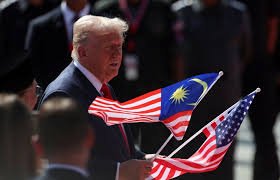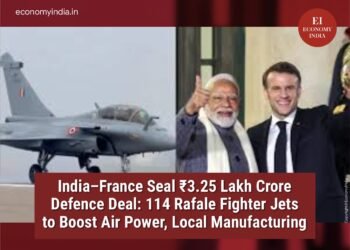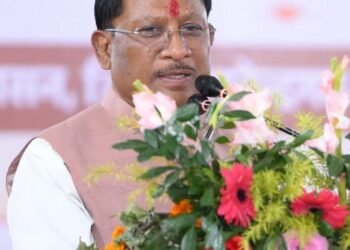In Kuala Lumpur, U.S. President Donald Trump mediates an unprecedented peace agreement between Thailand and Cambodia, ending a deadly border conflict — says, “We turned the impossible into possible.”
By Economy India International Bureau |
Diplomatic Drama Meets Celebration in Kuala Lumpur
In an extraordinary display of diplomacy, U.S. President Donald Trump arrived in Malaysia on Sunday to a ceremonial red-carpet welcome that soon turned into a spectacle. Trump, known for his flamboyant public persona, surprised the audience by joining local artists in a traditional Malaysian dance, drawing cheers from the crowd and wide attention from global media outlets.
However, the true highlight of his visit came just hours later when Trump presided over the signing of a historic peace agreement between Thailand and Cambodia, marking an end to their five-day-long military conflict over a disputed temple border.
“We Made the Impossible Possible,” Says Trump
Speaking at the peace accord ceremony in Kuala Lumpur, Trump hailed the agreement as a landmark step for Southeast Asian stability.
“For years, the world believed peace between Thailand and Cambodia was impossible. But today, we’ve shown that through dialogue and determination, the impossible can be achieved,”
— said President Donald Trump during the press conference.
The peace deal, signed by representatives from both nations in Trump’s presence, aims to resolve long-standing territorial disputes near the Preah Vihear Temple region, a site of deep historical and cultural significance.
According to diplomatic sources, U.S. mediation played a “critical role” in persuading both sides to cease hostilities, which had resulted in 48 deaths and hundreds displaced earlier this month.
ASEAN Summit 2025: Focus on Peace and Regional Sustainability
Trump’s visit coincided with the inauguration of the 47th ASEAN Summit, being held in Kuala Lumpur from October 11–13. The summit brings together leaders from 10 Southeast Asian nations to discuss key issues of economic growth, maritime security, regional integration, and climate sustainability.
This year’s summit theme — “Inclusivity and Sustainability” — emphasizes cooperation among ASEAN members and global partners to promote balanced development in the post-pandemic world.
India is being represented by External Affairs Minister S. Jaishankar, who will deliver India’s keynote address. Earlier reports had suggested that Prime Minister Narendra Modi might attend in person, but official sources have confirmed that he will participate virtually.

Red Carpet Diplomacy and Public Reaction
Trump’s unconventional diplomacy was again on display when he landed at Kuala Lumpur International Airport, where Malaysian Prime Minister Anwar Ibrahim personally welcomed him. The two leaders exchanged warm greetings before Trump joined a local cultural troupe for a symbolic dance performance.
Photos and videos of the moment flooded social media, portraying a lighter side of global diplomacy. However, the visit also sparked small-scale protests in downtown Kuala Lumpur, where groups demonstrated in support of Gaza and criticized U.S. foreign policy.
Security was tight throughout the capital, with Malaysian police deploying additional forces around summit venues and the U.S. embassy.
Trump’s Growing Interest in Southeast Asia
Analysts view Trump’s involvement in the Thailand–Cambodia peace process as an attempt to reassert U.S. influence in Southeast Asia, a region where China has expanded its economic and diplomatic presence.
Political strategist Dr. Michael Tan from the University of Singapore noted:
“This agreement is as much about peace as it is about power projection. Trump is using diplomacy as a tool to re-engage the ASEAN bloc and counterbalance China’s dominance.”
The move also positions Malaysia as a neutral diplomatic hub, strengthening its image as a mediator in regional and international conflicts.

Regional Reactions and Future Implications
Both Thailand and Cambodia have hailed the accord as a “new era of cooperation.” Thai Prime Minister Srettha Thavisin expressed gratitude to the U.S. for facilitating the talks, calling it “a step towards lasting friendship.” Cambodian Premier Hun Manet also welcomed the peace deal, emphasizing that “our people deserve peace, not war.”
The agreement includes mechanisms for joint border patrols, economic cooperation zones, and heritage preservation at disputed temple sites. Analysts believe that this could pave the way for deeper ASEAN security partnerships in the coming years.
In Pictures: Trump’s Malaysia Visit
📸 1. Trump arrives in Kuala Lumpur to a red-carpet welcome.
📸 2. Malaysian PM Anwar Ibrahim greets him with full state honors.
📸 3. Trump dances with local Malaysian artists in a traditional performance.
📸 4. Thailand and Cambodia sign the peace accord in Trump’s presence.
📸 5. Small protests erupt in downtown Kuala Lumpur supporting Gaza.
🧭 Economy India Analysis Box
| Key Focus | Details |
|---|---|
| Event | Trump brokers peace between Thailand & Cambodia at Kuala Lumpur |
| Summit | 47th ASEAN Summit (Theme: Inclusivity & Sustainability) |
| Economic Angle | Strengthening U.S. and ASEAN diplomatic-economic relations; potential impact on regional trade and defense alignment |
| India’s Role | External Affairs Minister S. Jaishankar represents India; PM Modi to join virtually |
| Outcome | Peace agreement signed; regional stability reinforced; U.S. influence in Southeast Asia reasserted |
| Future Outlook | Boost to cross-border cooperation, trade security, and ASEAN’s peace-building framework |
Expert View
“The Kuala Lumpur peace accord could redefine the diplomatic map of Southeast Asia. By bringing Thailand and Cambodia together, the U.S. not only ended a border war but reignited the idea of ASEAN unity,”
— Dr. Anita Raghavan, International Affairs Expert, New Delhi.
Trump’s Malaysia visit may have been filled with glitz, dance, and controversy — but its diplomatic impact is undeniably significant. The Thailand–Cambodia peace accord, sealed under his mediation, is being seen as a rare success story for U.S. diplomacy in Asia.
As ASEAN nations gather to deliberate the region’s future, the message from Kuala Lumpur is clear: peace, partnership, and perseverance remain the pillars of progress.
(Economy India)













